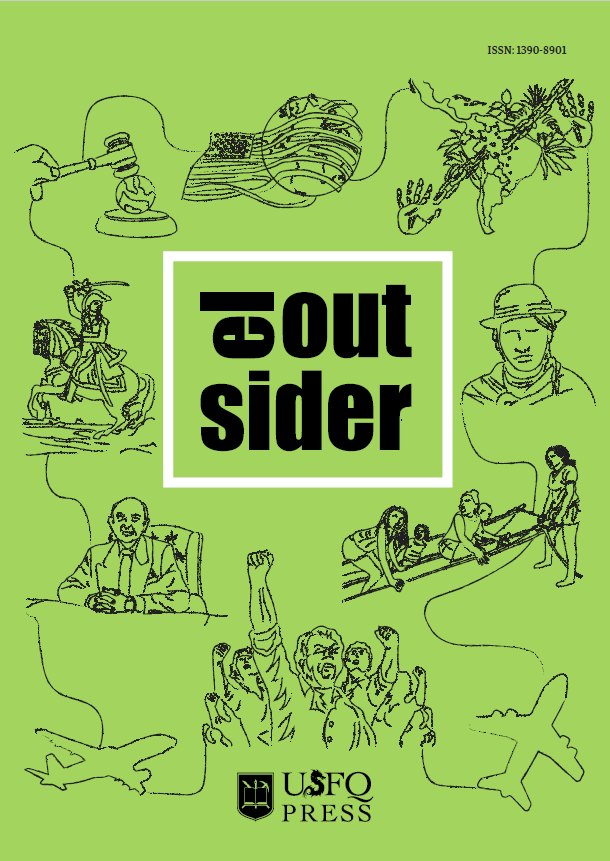Relaciones Internacionales “americanas” y la academia en el “Sur Global”
Contenido principal del artículo
Resumen
En 1977, Stanley Hoffman afirmó que las relaciones internacionales se consolidaron como una disciplina proveniente de la academia estadounidense, no solo por el ascenso de Estados Unidos como potencia, sino por los fundamentos epistemológicos y ontológicos sobre los que se asentaban. Sin embargo, la herencia de la academia americana supone una serie de implicaciones para el estudio de las Relaciones Internacionales en el Sur Global, donde cabe cuestionarnos si replicarla nos permite comprender las complejidades del colonialismo, imperialismo, racismo, cultura y género que han permeado la disciplina. Por lo tanto, este artículo busca entender cuáles son las implicaciones de reproducir la lógica académica de las RR.II. americanas en la academia en el Sur Global; afirmando que la homogeneización de la disciplina reproduce una lógica etnocéntrica que ha relegado ciertas voces a los márgenes de la disciplina.
Detalles del artículo
Citas
Acharya, Amitav. 2011. “Dialogue and Discovery: In Search of International Relations Theories Beyond the West.” Millennium: Journal of International Studies 39 (3): 619-637.
Acharya, Amitav, y Barry Buzan. 2017. “Why is there no Non-Western International Relations? Ten years on.” International Relations of the Asia-Pacific 17 (3): 341-370.
Aganthangelou, Anna M., y L.H.M Ling. 2004. “The House of IR: From Family Power Politics to the Poises of Worldism.” International Studies Review 6 (4): 21-49.
Ashley, Richard, y R.B.J Walker. 1990. “Speaking the Language of Exile: Dissident Thought in International Relations.” International Studies Quarterly 34 (3): 259–68.
Balzacq, Thierry, y Stéphane J. Baele. 2017. “The Third Debate and Postpositivism.” Oxford Research Encyclopedia of International Studies, Diciembre 22, 2017. Recuperado Abril 15, 2021. https://oxfordre.com/internationalstudies/view/10.1 093/acrefore/9780190846626.001.0001/acrefore-9780190846626-e-104.
Behera, Navnita. 2007. “Re-imagining IR in India.” International Relations of Asia-Pacific 7 (3): 341-368.
Bilgin, Pinar. 2008. “Thinking past ‘Western’ IR?.” Third World Quarterly 19 (1): 5-23. http://dx.doi.org/10.1080/01436590701726392
Chakrabarty, Dipesh. 2007. “The Idea of Provicinlizing Europe.” En Provincilizing Europe, 3-26. New Jersey: Princeton University Press.
Eun, Yong-Soo. 2019. “What is missing in the ongoing debate over non-Western IR theory building?” En Critical International Relations Theories in East Asia: Relationality, Subjectivity, and Pragmatism, editado por Kosuke Shimzu, 11-24. Londres: Routledge.
Grovogui, Siba. 2006. “Mind, Body, and Gut! Elements of a Postcolonial Human Rights Discourse.” En Decolonizing International Relations, editado por Branwen Gruffydd, 179-196. Lanham: Rowman and Littlefield Publishers, Inc.
Gruffydd, Branwen (ed.). 2006. Decolonizing International Relations. Lanham: Rowman and Littlefield Publishers, Inc.
Hoffman, Stanley. 1977. “An American Social Science: International Relations.” Daedalus 106 (3): 41-60.
Hutchings, Kimberly. 2011. “Dialogue between Whom? The Role of the West/Non-West Distinction in Promoting Global IR.” Millennium: Journal of International Studies 39 (3): 639-647.
Inayatulla, Naeem, y David B. Blaney. 2004. “The Westfalian Deferral.” En International Relations and the Problem of Difference, 18-41. New York: Routledge.
Kang, David. 2003. “Getting Asia Wrong.” International Security 27 (4): 57-85.
Krishna, Sankaran. 2001. “Race, Amnesia, and the Education of International Relations.” Alternatives 26: 401-424.
Ling, L.H.M. 2014. The Dao of World Politics: Towards a post-Westphalian, wordlist International Relations. Londres: Routledge.
— . 2015. “What’s the Point of IR?” Essay presented at the 50th Anniversary Celebration of IR Studies at Sussex University, Brighton, Inglaterra, Diciembre 10-11, 2015.
Qin, Yaqing. 2016. “A Relational Theory of World Politics.” International Studies Review 18, 33-47.
Seo, Jungmin, y Hwanbi Lee. 2019. “Indigenization of International Relation theories in Kore and China: Tails of two essentialisms.” En Critical International Relations Theories in East Asia: Relationality, Subjectivity, and Pragmatism, editado por Kosuke Shimzu, 50-63. Londres: Routledge.
Shani, Giorgio. 2008. “Toward a Post-Western IR: the Umma, Khalsa Panth, and Critical IR Theory.” International Studies Review 10 (4): 722–34.
Smith, Steve. 2000. “The discipline of international relations: still and American social science?” British Journal of Politics and International Relations 2 (3): 374-402.
—. 2002. “The United States and the Discipline of International Relations: Hegemonic Country, Hegemonic Discipline.” International Studies Review 4 (2): 67-85.
Tickner, J. Ann. 2011. “Dealing with Difference: Problems and Possibilities for Dialogue in International Relations.” Millennium: Journal of International Studies 39 (3): 607-618.
Vale, Peter, y Vineet Thakur. 2020. “IR and the making of the white man’s world.” En, International Relations from the Global South, editado por Arlene B. Tickner and Karen Smith. Londres: Routledge.
Waltz, Kenneth. 1979. Theory of International Politics. New York NY: McGraw-Hill.
Weaver, Ole. 1998. “The Sociology of a Not so International Discipline: American and European Developments in International Relations.” International Organization 52: 687-727.

